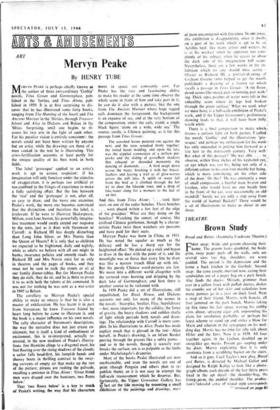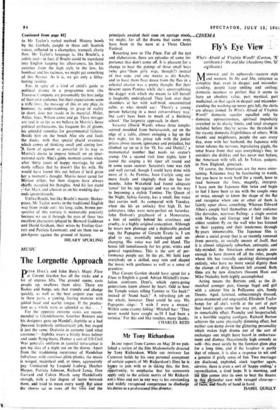THEATRE
Brown Study
Bread and Butter. (Jeannetta Cochrane Theatre.), FIRST snap: bride and groom choosing their home. The groom looks doubtful, the bride - grim, rusty paper peels off the walls, suits are . several sizes too big, shoulders are worn • padded. The period is the depression and the home a back kitchen in the Gorbals. Second snap: the same couple, married now, eating their sandwiches out of a paper bag on a park bench. Alec feeds the ducks; Miriam, grimmer than ever in a yellow frock with puffed sleeves, shakes the crumbs out of her skirt and calculates how many pennies go in a year on duck food. Next a snap of their friend, Morris, with fiancée, all four jammed on the park bench, Morris taking up five times his fair space, waving his stubby arms about, spraying cigar ash, expounding his ; plans for revolution probably; or perhaps his ! latest scheme to stand up and strike a blow for Marx and atheism in the synagogue on his wed-; ding day. Morris has no time for silly talk about ; Hitler and the Jews. Now it is 1939. All four together again, in the kitchen, doubled up in snoot-like gas masks. Poison gas seeping under 1 the oor. Morris explaining that it is only amnionia from a scrubbing bucket on the stairs., And so it goes. Cecil Taylor's new play, Breadi and Butter, is directed by Michael Geliot and designed by Ralph Koltai to look like a photo-, graphFalbum, each decade of the last thirty yearst fixed in the apt detail—the shoulder-bag, the frizzperm, the padded shoulder. The produc-: tion'Anlendid sense of visual style corresponds
'nntinued on page 84
Continued from page SI] to Mr Taylor's verbal method. History bowls by the Gorbals, caught in these soft Scottish voices, reflected in a changeless, tranquil, chatty flow. Mr Taylor's language is, like Brecht's, a subtle tool—in fact, if Brecht could be translated into English keeping his allusiveness, his brisk switches from the high style to the low, his bombast and his raciness, we might get something of this flavour. As it is, we get only a filthy- tasting residue.
For, in spite of a kind of child's guide to political drama in a programme note (the Traverse Company are presumably the best judge Of their own audience, but their expectations seem a trifle low), the message of this or any play, its humour, its understanding, its grasp of reality in short, does not reside in its material. Hitler, Attlee, Suez, Wilson come and go. These mirages are real in so far as we believe in Morris's fierce political enthusiasms, his frequent fits of gloom, his splendid -remedies for governmental failures. Beside him on the bench Alec sits and feeds the ducks. with that special placid sweetness
Which comes of thinking small and aiming low.
k form of egoism as powerful in its may as Morris's desire to impose himself on an inter- national scale. Alec's giddy moment comes when, after thirty years of happy marriage, he sud- denly reflects that he doesn't like his wife. He would have found this out before if he'd given her a moment's thought. Morris never cared for Miriam either, but then slogans have always Chiefly occupied his thoughts. And his last stand -=-for Marx and atheism as on his wedding day- -ends ignominiously.
Unlike Brecht, but like Brecht's master, Shakes- peare, Mr Taylor works in the traditional English way from inside out: his long, calm, brown per- spective of this century is memorable precisely because we see it through the eyes of these two excellent characters (played by Bernard Goldman and David Graham, their wives by Eveline (lar- ratt and Patricia Leventon); and see them too as pin-figures against the ground of history.
HILARY SPURLING































 Previous page
Previous page